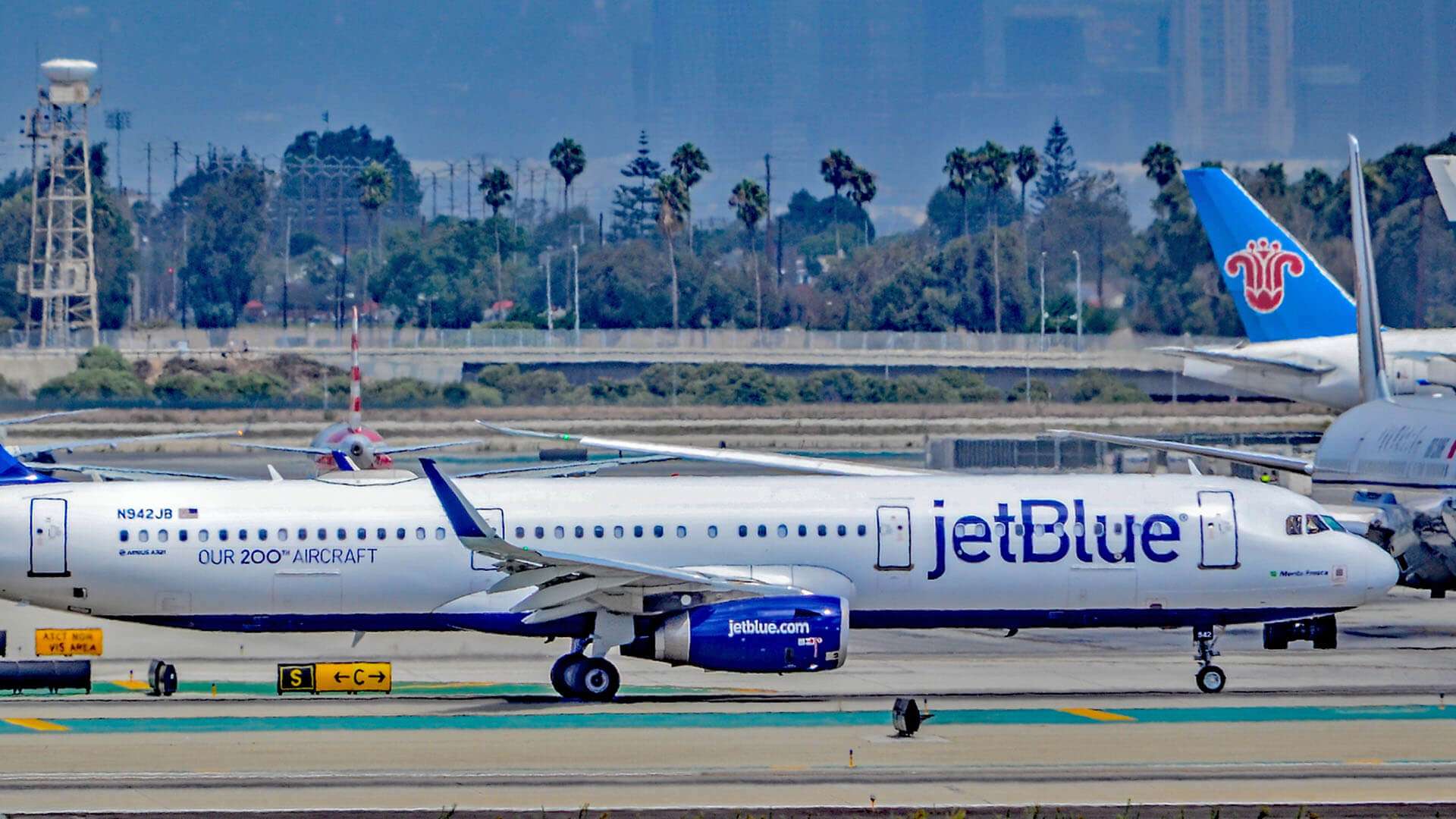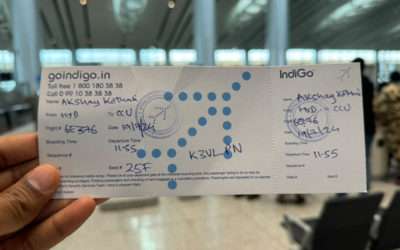
JetBlue is a company that has been mismanaged for years. Now, that poor management has invited numerous court actions and unwanted ire from the Justice Department.
JetBlue Merger Hits More Turbulance
Organizing
7 November 2022
JetBlue is facing mounting scrutiny over its planned merger with Spirit. A group of airline workers and consumers are filing a court challenge to try and slow the “almost unstoppable” march towards airline megalopoly.
The action comes as JetBlue posts the worst 3rd Quarter profits of any major carrier, earning a dismal $.21 a share, prompting investor concerns that airline management may be underperforming at a critical moment for the carrier. It’s also happening at a time when the airline is facing mounting concerns from the Justice Department over it’s de-facto merger with American in the Northeast markets.CEO Robin Hayes is expected to appear in court to defend the airline’s actions in that case. The airline is also facing questions from unions, who are asking if the company is being irresponsible financially, overpaying investors with what is being called “hush money” in case the deal with Spirit falls through. Unions are also calling for the airline to raise wages and offer better work / life balance for employees.
Flight Crews and consumers filed an injunction asking a Federal Judge to stop the planned $3.8 Billion merger between JetBlue Airways and Spirit Airlines in hopes of preserving one of the few remaining discount carriers in the U.S.
The group filed to stop the deal on Thursday, asking the U.S. District Court for the Northern District of California to block the transaction. The group argues that the new, larger airline could dominate key markets, leaving consumers no choice but to pay ticket prices that are impossible for either airline to command today.
If the merger goes through, the complaint argues, consumers “would not only lose the competition of Spirit, but also the potential competition that JetBlue would provide by building its own national presence the old-fashioned way, by competing for passengers instead of buying them.”
JetBlue is the sixth-largest airline operating in the U.S. Spirit is the seventh. The combined airline would immediately become the fifth-largest air carrier, right behind American, Delta, Southwest, and United.
The complaint argues that Spirit is a significant price-cutting rival of JetBlue and other major carriers and that, if the airline were eliminated from the commercial aviation ecosystem, other airlines would be free to hike fares on consumers. Moreover, the “current trend toward concentration, the lessening of competition, and the tendency to create a monopoly in the airline industry are unmatched and unparalleled,” the suit read.
It goes on to suggest that monopolistic power was the primary goal of the merger. “JetBlue would gain a majority market share on more than a dozen routes where neither it nor Spirit previously dominated, and it would eliminate the price-cutting by Spirit. Therefore, JetBlue made an unsolicited tender offer to purchase Spirit in order to eliminate that competition,” according to the filing.
The complaint states that Spirit is unique in commercial aviation because it’s small enough to survive on smaller ticket prices but large enough to compete against mega-carriers such as United and Southwest.
“Spirit, with its innovative, low-cost service, is an important bulwark against this almost unstoppable trend toward complete concentration and monopoly in the airline industry,” the suit says.
The proposed merger wouldn’t just eliminate another discount option for travelers; it would also remove an essential reason for the four mega-carriers to avoid “abuses” directed toward the flying public. If the Big Four airlines are no longer afraid of losing passengers to Spirit, the result may be skies that are even less friendly than they already are. If the JetBlue / Spirit deal is ultimately allowed to go forward, discount airfares in the U.S. will shrink by 50% overnight.
Earlier in 2022, the Spirit Board and executives concluded that a merger between Spirit and JetBlue could never be approved by regulators and was, therefore, “illusory.” The Board then rejected an earlier offer by JetBlue. JetBlue offered to “sweeten the deal” by paying the shareholders $400 million if the proposed combination failed. Thus the shareholders could move forward with the JetBlue combination without any risks. The $400 million to shareholders was to quiet the shareholder’s knowledge of the potential illegality of the acquisitions and was little more than “hush money” according to the suit.
Related News
Microsoft Update Triggers The Largest Tech Disaster in History
Microsoft Update Triggers The Largest Tech Disaster in HistoryOn Friday morning, a global computer outage led to the cancellation of hundreds of flights across the United States, causing delays and confusion at airports nationwide. The disruption also affected...
Supreme Court Strikes At Federal Experts
Supreme Court Strikes At Federal ExpertsWASHINGTON, D.C. - On June 28, 2024, the U.S. Supreme Court issued a landmark decision that will drastically alter the government's ability to enforce workplace safety, aviation standards, and commercial flight operations. This...
Hurricane Beryl Assistance and Resources
Disaster Assistance Resources AvailableJuly 15, 2024 Dear Sisters and Brothers, Hurricane Beryl made landfall on Monday, July 8, 2024, near Matagorda, TX, about 100 miles from Houston, battering Southeast Texas with heavy rains and winds. The storm has caused...

JetBlue Merger Hits More Turbulence
7 November 2022
JetBlue is facing mounting scrutiny over its planned merger with Spirit. A group of airline workers and consumers are filing a court challenge to try and slow the “almost unstoppable” march towards airline megalopoly.
The action comes as JetBlue posts the worst 3rd Quarter profits of any major carrier, earning a dismal $.21 a share, prompting investor concerns that airline management may be underperforming at a critical moment for the carrier. It’s also happening at a time when the airline is facing mounting concerns from the Justice Department over its de-facto merger with American in the Northeast markets.CEO Robin Hayes is expected to appear in court to defend the airline’s actions in that case. The airline is also facing questions from unions, who are asking if the company is being irresponsible financially, overpaying investors with what is being called “hush money” in case the deal with Spirit falls through. Unions are also calling for the airline to raise wages and offer better work/life balance for employees.
Flight Crews and consumers filed an injunction asking a Federal Judge to stop the planned $3.8 Billion merger between JetBlue Airways and Spirit Airlines in hopes of preserving one of the few remaining discount carriers in the U.S.
The group filed to stop the deal on Thursday, asking the U.S. District Court for the Northern District of California to block the transaction. The group argues that the new, larger airline could dominate key markets, leaving consumers no choice but to pay ticket prices that are impossible for either airline to command today.
If the merger goes through, the complaint argues, consumers “would not only lose the competition of Spirit, but also the potential competition that JetBlue would provide by building its own national presence the old-fashioned way, by competing for passengers instead of buying them.”
JetBlue is the sixth-largest airline operating in the U.S. Spirit is the seventh. The combined airline would immediately become the fifth-largest air carrier, right behind American, Delta, Southwest, and United.
The complaint argues that Spirit is a significant price-cutting rival of JetBlue and other major carriers and that, if the airline were eliminated from the commercial aviation ecosystem, other airlines would be free to hike fares on consumers. Moreover, the “current trend toward concentration, the lessening of competition, and the tendency to create a monopoly in the airline industry are unmatched and unparalleled,” the suit read.
It goes on to suggest that monopolistic power was the primary goal of the merger. “JetBlue would gain a majority market share on more than a dozen routes where neither it nor Spirit previously dominated, and it would eliminate the price-cutting by Spirit. Therefore, JetBlue made an unsolicited tender offer to purchase Spirit in order to eliminate that competition,” according to the filing.
The complaint states that Spirit is unique in commercial aviation because it’s small enough to survive on smaller ticket prices but large enough to compete against mega-carriers such as United and Southwest.
“Spirit, with its innovative, low-cost service, is an important bulwark against this almost unstoppable trend toward complete concentration and monopoly in the airline industry,” the suit says.
The proposed merger wouldn’t just eliminate another discount option for travelers; it would also remove an essential reason for the four mega-carriers to avoid “abuses” directed toward the flying public. If the Big Four airlines are no longer afraid of losing passengers to Spirit, the result may be skies that are even less friendly than they already are. If the JetBlue / Spirit deal is ultimately allowed to go forward, discount airfares in the U.S. will shrink by 50% overnight.
The proposed merger wouldn’t just eliminate another discount option for travelers; it would also remove an essential reason for the four mega-carriers to avoid “abuses” directed toward the flying public. If the Big Four airlines are no longer afraid of losing passengers to Spirit, the result may be skies that are even less friendly than they already are. If the JetBlue / Spirit deal is ultimately allowed to go forward, discount airfares in the U.S. will shrink by 50% overnight.
Earlier in 2022, the Spirit Board and executives concluded that a merger between Spirit and JetBlue could never be approved by regulators and was, therefore, “illusory.” The Board then rejected an earlier offer by JetBlue. JetBlue offered to “sweeten the deal” by paying the shareholders $400 million if the proposed combination failed. Thus the shareholders could move forward with the JetBlue combination without any risks. The $400 million to shareholders was to quiet the shareholder’s knowledge of the potential illegality of the acquisitions and was little more than “hush money” according to the suit.
Related News
Microsoft Update Triggers The Largest Tech Disaster in History
Microsoft Update Triggers The Largest Tech Disaster in HistoryOn Friday morning, a global computer outage led to the cancellation of hundreds of flights across the United States, causing delays and confusion at airports nationwide. The disruption also affected...
Supreme Court Strikes At Federal Experts
Supreme Court Strikes At Federal ExpertsWASHINGTON, D.C. - On June 28, 2024, the U.S. Supreme Court issued a landmark decision that will drastically alter the government's ability to enforce workplace safety, aviation standards, and commercial flight operations. This...
Hurricane Beryl Assistance and Resources
Disaster Assistance Resources AvailableJuly 15, 2024 Dear Sisters and Brothers, Hurricane Beryl made landfall on Monday, July 8, 2024, near Matagorda, TX, about 100 miles from Houston, battering Southeast Texas with heavy rains and winds. The storm has caused...








